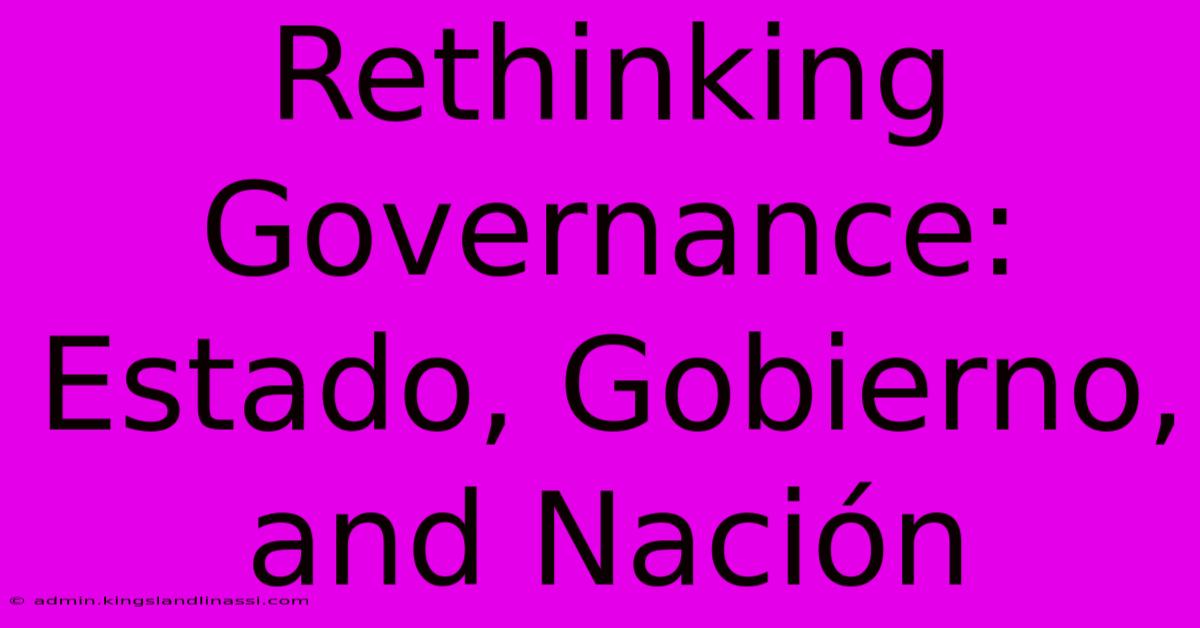Rethinking Governance: Estado, Gobierno, And Nación

Table of Contents
Rethinking Governance: Estado, Gobierno, and Nación
The concepts of Estado, Gobierno, and Nación are often used interchangeably, leading to confusion in discussions of governance. However, understanding the nuanced differences between these terms is crucial for a comprehensive analysis of power structures and their impact on society. This article delves into the distinct characteristics of each term and explores the evolving relationships between them in the context of modern governance.
Understanding the Distinctions: Estado, Gobierno, and Nación
While interconnected, Estado, Gobierno, and Nación represent distinct yet overlapping entities within a political system. Let's clarify their individual meanings:
Estado (State):
The Estado refers to the permanent institutional framework of a political entity. It encompasses the entire apparatus of government, including its institutions, bureaucracy, legal system, and sovereign territory. It's the enduring structure that persists beyond changes in government. Key characteristics of the Estado include:
- Sovereignty: The ultimate authority within its defined territory.
- Monopoly on legitimate violence: The exclusive right to use force within its borders.
- Legal personality: The capacity to enter into agreements and contracts.
- Bureaucracy: The administrative machinery that implements its policies.
Gobierno (Government):
The Gobierno represents the group of people currently exercising political power. This is the ruling body, the administration responsible for implementing the policies and laws of the Estado. Unlike the Estado, the Gobierno is temporary; it changes with elections or other political transitions. Key aspects of the Gobierno are:
- Executive power: The authority to enforce laws and administer the state.
- Legitimacy: The acceptance of its authority by the population.
- Accountability: Its responsibility to the Estado and the people.
- Temporality: Its limited tenure in power.
Nación (Nation):
The Nación refers to a shared community of people bound by common cultural, linguistic, historical, or ethnic ties. It is a collective identity that may or may not coincide with the boundaries of the Estado. A Nación can exist without a state (e.g., the Kurds), and a state can contain multiple Naciones (e.g., Canada). Key components of a Nación include:
- Shared identity: A sense of belonging based on common characteristics.
- Collective consciousness: An awareness of being part of a larger group.
- Nationalism: A feeling of loyalty and attachment to the Nación.
- Potential for self-determination: The desire to govern oneself.
The Interplay and Evolution of Estado, Gobierno, and Nación
The relationship between Estado, Gobierno, and Nación is complex and dynamic. Historically, the Estado often sought to create a unified Nación through various processes of nation-building. However, this process frequently involved the suppression of minority cultures and identities.
In modern times, the relationship is undergoing significant transformations:
- Globalization: The increasing interconnectedness of the world challenges the sovereignty of the Estado and affects the power dynamics between the Gobierno and the Nación.
- Rise of populism: Populist movements often directly challenge the established institutions of the Estado and the authority of the Gobierno, appealing directly to the sentiments of the Nación.
- Technological advancements: New technologies can both strengthen and weaken the Estado, altering the way the Gobierno interacts with its citizens and impacting national identity.
- Increased demands for accountability: Citizens increasingly demand greater transparency and accountability from both the Estado and the Gobierno, pushing for a more participatory governance model.
Rethinking Governance in a Changing World
Understanding the distinctions between Estado, Gobierno, and Nación is crucial for effective governance in the 21st century. The challenges posed by globalization, technological change, and shifting social dynamics require a nuanced approach that recognizes the interconnectedness of these concepts. Future governance models must find ways to balance the needs of the Estado, the demands of the Gobierno, and the aspirations of the Nación, fostering inclusivity and ensuring both stability and progress. A renewed focus on participatory governance, transparency, and the protection of human rights is essential for building robust and resilient societies.
This requires a continuous re-evaluation of the existing power structures and a commitment to fostering a dynamic balance between the three crucial concepts of Estado, Gobierno, and Nación. Only then can we ensure a more just and equitable future for all.

Thank you for visiting our website wich cover about Rethinking Governance: Estado, Gobierno, And Nación. We hope the information provided has been useful to you. Feel free to contact us if you have any questions or need further assistance. See you next time and dont miss to bookmark.
Featured Posts
-
Satoshi Nakamotos Net Worth An Unanswerable Question
Apr 28, 2025
-
Embrace The Change Women Age Vibrantly
Apr 28, 2025
-
Michael Polansky His Net Worth And Business Strategies
Apr 28, 2025
-
Saif Ali Khans Son Is He The Next Big Bollywood Icon
Apr 28, 2025
-
Georgina Rodriguez Age Vs Appearance
Apr 28, 2025
